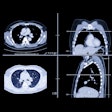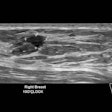
Writing recently on this site, Dr. Chris Hammond painted a bleak and depressingly accurate picture of working in the U.K. National Health Service (NHS) as we look to recover from the pandemic. His experiences are not confined to one institution -- the pressures he describes are being felt across the country. Chronic underfunding of health and care services has left us struggling with seemingly insurmountable pressures.
 Dr. Giles Maskell.
Dr. Giles Maskell.Chris described the moral hazard afflicting staff working in these circumstances. All of us go to work to do a good job -- there is nothing more demoralizing than working hard to provide a service that you know to be of poor quality and being confronted with the evidence of that on a daily or even hourly basis.
So what should we do, those of us who are not ready to give up and still believe in the value of what we do for our patients?
Prof. Michael West from Lancaster University Management School, U.K., spoke recently at the Royal College of Radiologists' REAL meeting in Manchester. He has written extensively on culture, behavior, and performance in healthcare teams. He summarized three core work needs that all of us have:
- Autonomy -- we need to feel that we have some control over our work life and that we are able to act consistently with our values
- Belonging -- we need to feel part of a team, to feel valued, respected and supported
- Contribution -- we need to believe that what we do makes a difference.
Keeping those core needs in mind, here are my five personal tips for survival in this hostile landscape:
- Look after yourself
The basic stuff -- what you eat and drink. And how much of it. Exercise -- the benefits are under-recognized, but of proven value to mental as well as physical health. Build it into your daily routine if you can. Know when your next holiday is and make it a good one.
- Look after your colleagues
Radiologists lucky enough to be working in strong teams have a ready-made support structure. If you're finding the going tough, the chances are that your colleagues are too. Don't suffer in silence and don't suffer alone. At any given moment, there will be others in your team who need help at least as much as you do. Never underestimate the impact that your words and actions can have on those with whom you work. Make your impact a positive one. One of the characteristics of strong teams is that they meet regularly. If you're not seeing enough of your colleagues, see if there's something you can do about that. Can you build a regular tea or coffee break into your day? If so, can you share it with colleagues?
- Don't take it personally
It is not your fault that the system in which you work is failing. You didn't cause this mess, and similarly, you can't fix it -- at least not on your own. But that doesn't mean there's nothing you can do.
- Look for small victories (and celebrate them)
The overall picture may be bleak, but we can still use our knowledge and skills to provide great care to individual patients. It's easy to feel overwhelmed by the size of the task and the complexity of the problems facing the health service as a whole. But don't lose sight of how much good you can do on a small scale. I've written before about the impact on productivity of making the task manageable -- don't stare at the seemingly endless worklist for too long. Move five or 10 studies onto a separate list and report them really well. Then you can think about the next 10.
- Don't lose sight of the longer term
However challenging the immediate future, it's worth keeping half an eye on the longer term. And I don't just mean knowing when you can retire and leave all this behind! In the U.K., we are finally seeing a significant expansion of radiology training places. This is long overdue but still welcome. The task for us all now is to ensure that we give the best possible training to the next generation of radiologists. You have a wealth of wisdom to pass on -- don't waste it. And one of the things you've learned is how to survive when the going gets tough. That's knowledge well worth passing on.
Dr. Giles Maskell is a consultant radiologist at Royal Cornwall Hospitals National Health Service (NHS) Trust, Truro, U.K. He is a former president of the U.K. Royal College of Radiologists. Competing interests: None declared.
The comments and observations expressed herein do not necessarily reflect the opinions of AuntMinnieEurope.com, nor should they be construed as an endorsement or admonishment of any particular vendor, analyst, industry consultant, or consulting group.



















